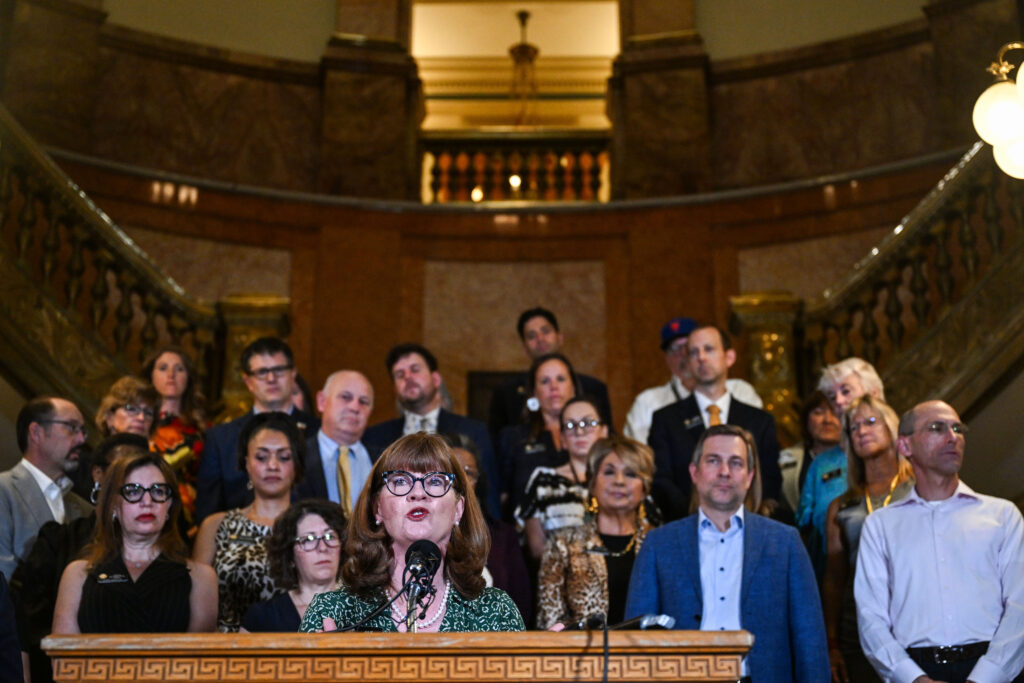Amend or repeal? Proposals surface to effectively undo AI regulation law in Colorado

While finding a way to plug an almost $800 million budget hole tops the business for lawmakers at next week’s special session, time is also closing fast for a fix to a 2024 law on artificial intelligence.
And so far, four bills seek to modify the law, some of which would effectively repeal the mandates.
Gov. Jared Polis signed the new law outlining regulations on AI, though not without misgivings.
At least four bills are being planned for the special session. Colorado Politics has obtained drafts of three of the four. The fourth proposal is believed to be coming from Senate Majority Leader Robert Rodriguez, D-Denver, the original sponsor of Senate Bill 205, the AI regulation measure.
SB 205 sought to establish guardrails around the use of artificial intelligence, largely in employment, health care, education, and government practices, where, backers said, the risk of bias or discrimination exists. It’s believed to be the first law in the nation regulating artificial intelligence.
Businesses have argued that the new law is problematic, potentially penalizing mom-and-pop end users of the technology, instead of the big companies that created the AI software.
While the governor signed Senate Bill 24-205, he pushed for adjustments to address lingering worries. In his signing statement, Polis asked lawmakers to keep working on the legislation before its 2026 implementation date.
“I am concerned about the impact this law may have on an industry fueling critical technological advancements,” Polis said.
State-level government regulation, he added, can “tamper with innovation and deter competition.”
A month later, the governor, Attorney General Phil Weiser and Rodriguez penned a joint letter to “innovators, consumers and all those interested in the AI space,” in which they pledged to provide clarity around the law and minimize the “unintended consequences” associated with the bill’s implementation. That includes convening a legislatively created task force to propose recommendations on changes.
The officials said “home-grown businesses” had highlighted a risk tied to an “overly broad definition of AI,” along with disclosure requirements that could impose high costs and result in barriers to growth and product development, job losses, and limitations on raising capital.
Later worries also surfaced around the cost, an issue raised by a coalition of schools, colleges, tech, and medical organizations.
In a recent letter to the governor, the coalition said the law creates “unexpected and costly problems for organizations simply using everyday AI-enabled software, from K-12 schools and universities to hospitals, banks, and local governments.”
A draft of a bill from Rep. William Lindstedt, D-Broomfield, primarily deals with developers, something that has been sought by “deployers” — anyone who uses AI for the functions listed above, including small businesses.
Lindstedt’s bill is largely a repeal of SB 205, replacing it with a requirement that developers adhere to the Colorado Consumer Protection Act and the Colorado Anti-Discrimination Act. Enforcement would be handled by the Attorney General.
Under the proposed legislation, deployers would be required to notify consumers that they’re interacting with AI, but leaves out a lengthy list of other requirements for deployers highlighted in SB 205. Businesses said those requirements would be burdensome.
Meanwhile, the draft proposed by Rep. Ron Weinberg, R-Loveland, tightens some of the requirements in SB 205 and extends the implementation date to Aug. 1, 2027.
It narrows the definition of “consequential decision” to only include those related to employment, civil liberties, or public safety. That would remove decisions tied to education enrollment, financial or lending services, essential government services, health care services, insurance or legal services.
The draft bill also exempts businesses with fewer than 250 employees, companies with less than $5 million in annual revenue and local governments with fewer than 100,000 residents. That would eliminate all but the state’s top 11 counties.
The draft proposed by Sen. Mark Baisley, R-Woodland Park, appears to repeal SB 205 in its entirety, and replace it with a statement that discrimination by digital, automated, algorithmic, artificial intelligence, machine learning or other technological processes is prohibited.
It’s not clear which one — or ones — have the support of legislative leaders or the buy-in from the governor.
Rodriguez told Axios Denver on Wednesday that he doesn’t want to debate AI in the special session, calling it “distracting” and “messy.”
As majority leader, Rodriguez can wield power, sending the AI bills to unfriendly committees, for example.
Several other states, including California, Texas, Utah and Tennessee have also passed laws regulating AI.













